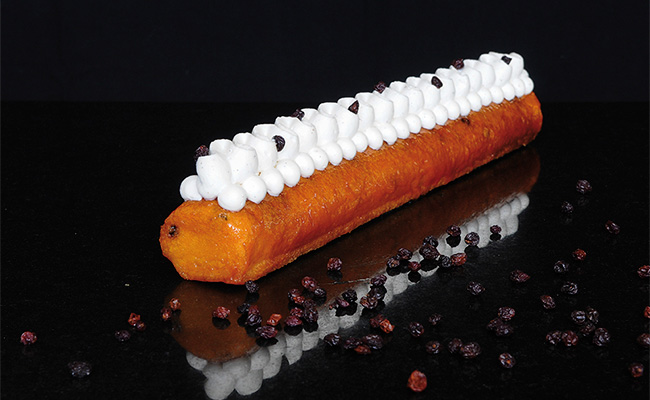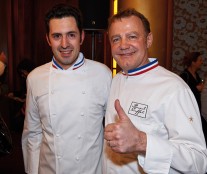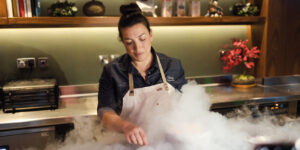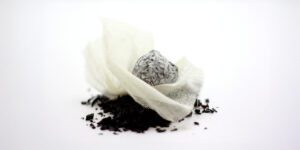Categories Pastry Chef Articles
Julien Boutonnet: ‘For me, the MOF was the real objective to be reached’
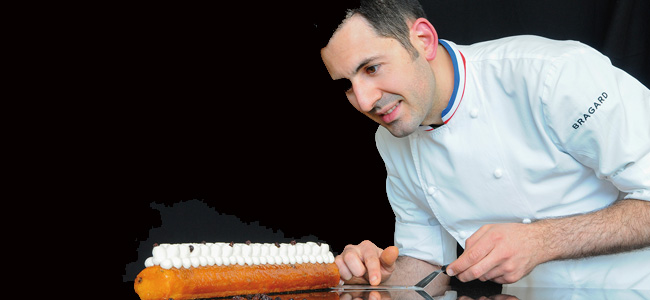
Julien Boutonnet, 34, has been pastry chef at the Olivier Bajard’s international school in Perpignan since 2008. In his development as a pastry chef professionals such as Robert Guerre were fundamental, ‘he was the one who inspired me and taught me the artistic side of this trade.’ It is also worth highlighting the two years spent in Pascal Caffet’s workshop and two years in the Four Seasons Geneva. This was the second time that he competed for the title of MOF patissier, after his first attempt in the previous edition held in 2011.
When did you decide to become a pastry chef?
When I was very little. For me, pastry is a true vocation, because at 10 I began to have contact with ovens at bakeries and pastry shops.
What experiences or professionals have left a mark in a special way?
My first competition, France’s Best Apprentice, which I participated in when I was 18. I have very good memories of that experience, and was the starting point of my career. Upon completion of that contest I decided to travel to France to work for various renowned patisseries, so I could develop my professional experience.
When did you decide to go all out and present yourself for the title of MOF?
I have always been passionate about this profession, since I started learning. When I was able to get the silver medal in the final of France’s Best Apprentice I began a career with experiences in various competitions. For me, the MOF was the real objective to be reached.
I had to make many family, financial and professional sacrifices, and so it is very important to have the support of those around you, like your friends
Preparing for this competition involves great sacrifice. What sacrifices would you highlight? What do you think is essential to address this preparation period successfully?
I had to make many family, financial and professional sacrifices, and so it is very important to have the support of those around you, like your friends. For my part, I decided to take courses in sophrology in order to better manage the competition’s high levels of stress. It’s also necessary to be in good physical shape to face the 30 hours of the events.
Tell us about your experience preparing for the MOF: How much time did you devote to it? Did you think about quitting at some point? What was key in your preparation?
I devoted all my free time preparing for this competition. For the selection, I trained after work and at weekends. But for the final, when it was coming up, I decided to take two months of leave to work tirelessly seven days a week.
In this edition, I never thought about quitting, even during those moments of doubt, thanks to the daily support of my environment and the motivation I had, especially after staying in the MOF final in 2011. Throughout this period of preparation, commitment to an entirely professional work and having my coach’s advice were key.
What event were you most afraid of?
Transportation was the part I feared. The piece I took to Paris had to endure a journey of 1000 km. Unfortunately, it broke the day of the journey, so with very little time I had to retrieve the few still usable elements, glue and pull the sugar a little and reassemble a piece before embarking on the road to Paris. I would have liked to retouch and improve it further.
I decided to take courses in sophrology in order to better manage the competition’s high levels of stress
Tell us about the final: How did you experience the competition days emotionally and psychologically?
I was well-prepared psychologically. It may be due to my first experience in the competition. Therefore, I went through the events well, finishing my program in the time allotted. The truth is that there is a lot of excitement over the four days of the competition, but especially during the announcement of the results.
What do you think was key to receiving this great recognition?
Regularity, simplicity of the products presented and, above all, the fact that it was personal work.
What would you highlight in the work you presented?
My chocolate Cupid piece. I was looking for a piece that was both refined and powerful. Coming up the shapes and creating and assembling the thermo-formed molds for the character took a long time in the preparation for the competition. I used this option to be effective on D-Day.
What does this recognition mean to you?
I am very proud of having this title and the recognition from my peers. This reward is an extra motivation to continue striving for perfection and excellence daily, which is to now regain my duties at Olivier Bajard’s International School of Pastry in Perpignan.
Pascal Caffet, Julien Boutonnet’s trainer
It is important to stress the vital work done by great pastry chefs so that new MOFs are really prepared. We especially highlight the support given to Julien Boutonnet by Pascal Caffet, who had worked with him for two years and with whom he has an excellent relationship. When Julien did not win the title of MOF in 2011, Pascal thought he needed help and offered to train him for the next edition.
How have you supported Julien Boutonnet?
I decided to give Julien my support so he could give his all and thus achieve success. My support was both moral and technical.
Why devote your efforts to transmit your know-how to the new generations, to the point that someone could obtain the title of MOF?
Transmission is, in my opinion, the mission of a MOF. We must make our trade perennial; pass the knowledge on to the next generations.
How did you reconcile the preparation of young talent with the workshop’s day-to-day life?
It’s part of my job, my role and my passion. Combining both tasks is natural. It is essential to pass on to younger generations so as to perpetuate and evolve the trade.
Transmission is, in my opinion, the mission of a MOF. We must make our trade perennial; pass the knowledge on to the next generations
What are the keys to being a good mentor?
First, listen to the person you are mentoring carefully. You have to know how to give advice at the right time, letting them create, make mistakes, and try. My role is to be there for moral support to and to answer any questions at any time.
What qualities do you think are essential to making the decision to compete to be MOF?
One must have a strong desire to make a dream come true, and a person who incites you to carry it out is necessary. It is a beautiful adventure that requires a lot of work. It also requires building a winning mentality.
Rum Baba by Julien Boutonnet, you will find this recipe in so good #14
